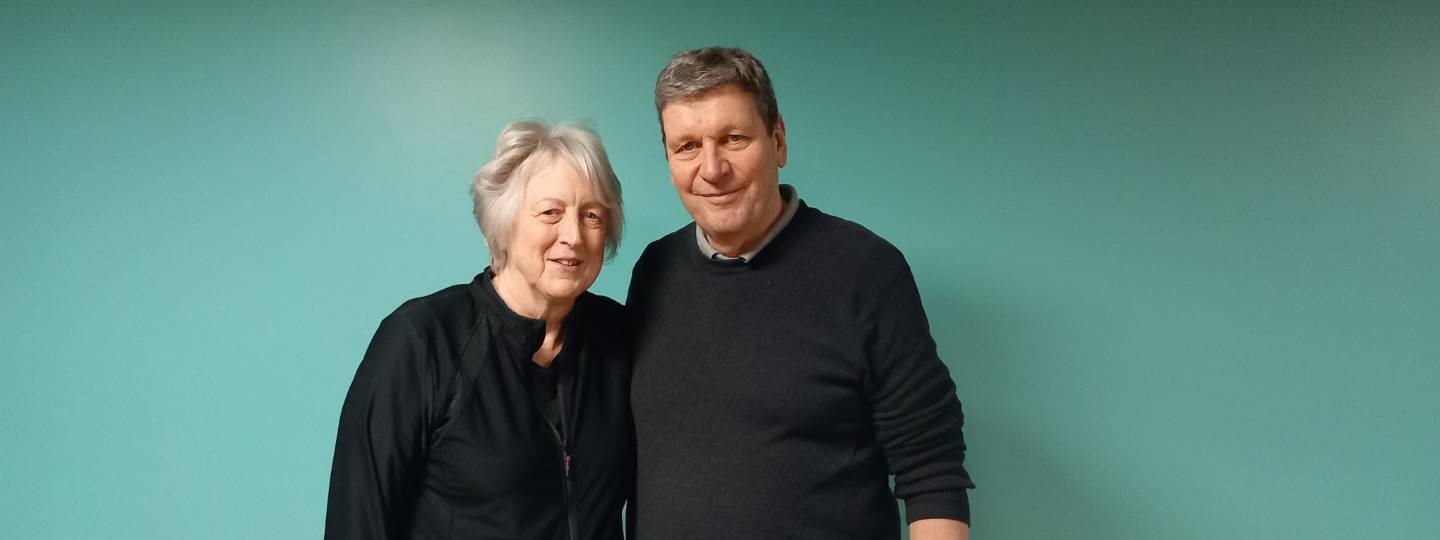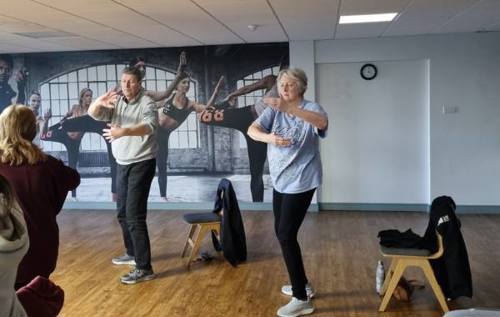Paul and Anne discuss the benefits of Tai Chi with osteoarthritis
16 May 2024
Tai Chi is a traditional Chinese martial art which has become a popular exercise. It focuses on the mind as well as the body, which makes it a great way to improve both your physical and mental wellbeing.
Paul and Anne, a couple from Birmingham, both have osteoarthritis and have felt the benefits of tai chi.
Here they share how taking part in a 14-week tai chi programme, led by Versus Arthritis with funding from the Peter Harrison Foundation, has helped them to manage their symptoms and live well with osteoarthritis.
Living with osteoarthritis
Paul and Anne were both diagnosed with osteoarthritis within the last few years and wanted to do something to ease their arthritis pain.
Osteoarthritis can affect any joint in the body. While our joints are made of complex living tissue that our bodies constantly repair and maintain, osteoarthritis occurs when our bodies can no longer do this effectively. The cartilage becomes thin, and the joint cannot move as easily as before, causing pain, stiffness and sometimes swelling as the body attempts to repair the joint.
“Before starting, I wasn’t doing exercise,” Anne says. “I used to do Pilates, but I got vertigo. We go canoe paddling on the canal every Friday but other than that I wasn’t doing anything else.”
Paul wanted to find an exercise that would help him to carry on with his hobbies.
“My arthritis causes a weakness in the wrist and the pain prevents me from certain things,” he says, “I do work down the workshop and I’m not going to stop doing that.”
Tai Chi with osteoarthritis
 Some people find it can be hard to keep moving when they have arthritis.
Some people find it can be hard to keep moving when they have arthritis.
But staying as active as possible can reduce your pain and the symptoms of your condition, helping you to stay independent.
Tai Chi teacher Daphne Richardson says that one of the best things about Tai Chi is its adaptability. It is a great exercise for beginners or people with specific needs.
“Some people joined for the first time last week, so the teacher is catering for different abilities and levels of experience,” Paul says. “He covers all the basics as part of the warm up. We’ll carry on doing a movement we’ve already done and the others will be doing it just the once. He’s very conscious that some people might need to sit down, too.”
Paul and Anne have enjoyed how gentle Tai Chi is.
“A lot of it is about coordination and movement as opposed to vigorous exercise,” Anne says. “It’s more of a natural flow and the most energetic thing you’re doing is rocking from side to side.”
“The more you do it, the more you’re going to improve on the quality of the movement,” Paul says. “That’s just time. It’s a long-term thing. You can’t just do an 18-week course and then expect to be Superman. It’s something you’ve got to stick at.”
Mindfulness
Many people find Tai Chi to be beneficial for emotional wellbeing as well as physical wellbeing.
Paul and Anne have so far enjoyed the classes. Anne says that it is “really quiet and calm and there’s lovely music.”
“There is space to grow,” Paul says. “The class is very positive, focused on building it into a lifestyle rather than targets. There’s very little right or wrong. The teacher is very good at empowering you to do a move even if it’s not exactly accurate.”
Tai Chi focuses heavily on breathing. This, alongside its slow movements, means it can be relaxing as well as an effective exercise.
“We did some conscious breathing this week and we both related to that, and we got some resources to do afterwards,” Paul says. “It is about making time in your life to sit and meditate for a while and get your breathing together.”
“It’s helping me to understand my body and learn how it works,” Anne says. “The teacher is very good at explaining the energy when you’re doing it. He’s very responsive and positive. You can feel the energy in the room.”
Beyond the Classes
These classes took place at a leisure centre in Sutton Coldfield and were funded by the Peter Harrison Foundation.
Versus Arthritis ran seven classes which include:
- aqua
- tai chi
- low-impact conditioning
- low-impact dance fitness
- online sessions (mediation and chair yoga).
Paul and Anne hope that this won’t be the end of their tai chi journey.
“We will look to do it somewhere else once these free sessions are over,” says Anne. “The leisure centre is 15 minutes down the road, and we’re so relaxed afterwards. It’s something you should do more than once a week as well. We’d have to learn more of it and make sure we’re confident.”
“I feel sure that it will give us a positive change in the future,” says Paul. “Some things are a chore to go to, but this doesn’t feel like that at all. Each move is different and there’s a meaning behind it all, and that will all link together. That’s why you’ve got to stick with it.”
“There hasn’t been a Thursday where I’ve felt like I didn’t want to go. There has been that feeling for other classes, but not for this. It’s very easy to make an excuse not to go to something. You have to prioritise that time and build it into your routine.”
We’re here to help
The classes have been very popular and we at Versus Arthritis hope to be able to run more. We are working on the next steps. If interested, please email our Physical Activities team.
If you would like to find out more ways to stay active, why not try Let’s Move with Leon?
This 12-week programme offers 30-minute movement sessions, designed to help you improve mobility, posture, balance, cardiovascular and respiratory fitness and strength.
You can also join our Let’s Move Facebook group, a space where people share their experience of staying active when living with arthritis. Or you can sign up to our Let’s Move newsletter to receive advice and top tips on how to stay active with arthritis.
For more advice or support, you can also:
- Call our free helpline on 0800 5200 520.
- Chat to our Arthritis Virtual Assistant.
- Join our online community.
- Stay in touch and follow us on X (Twitter), Facebook and Instagram.